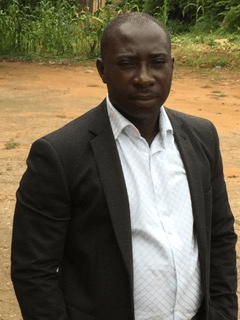The Harvard Chan Bioinformatics Core (HBC) is welcoming their H3Africa interns this week!
H3ABioNet, a Pan African Bioinformatics Network, supports Human Heredity and Health in Africa (H3Africa) research projects through the development of bioinformatics capacity on the continent.
Harvard is a training node of H3ABioNet and established a 3-month H3ABioNet-Harvard Bioinformatics Internship Program managed by the HBC. The program will allow interns to conduct research, take classes in specialized subjects relevant to informatics or quantitative analysis, and develop new courses in close collaboration with Harvard faculty, while leveraging their scientific potential and improving their leadership skills.
Amel Ghouila

What brought you to the Department?
I am a bioinformatician at Institut Pasteur de Tunis which is part of the International Network of Pasteur Institutes. I am specifically working on the frame of the Pan African Bioinformatics network H3ABionet that supports H3Africa researchers and their projects while developing Bioinformatics capacity within Africa. Harvard is a training node of H3ABioNet and established a three-month “H3ABioNet-Harvard Bioinformatics Internship Program” managed by the Bioinformatics core team at HSPH that allows young scientists from the network to spend 3 months working in collaboration with Harvard scientists to leverage their scientific potential and improve their leadership skills. I will be working with Taj Azarian in Marc Lipstich’s group and the Bioinformatics Core team.
Where are you from, and what do you do back home?
I am a computer scientist by background and then did a PhD thesis in Bioinformatics in France during which I developed protein domains prediction methods adapted to Eukaryotic pathogens to further improve functional annotation. In my home institution in Tunisia I mainly do work on comparative genomics and functional annotation using high-throughput DNAseq and RNAseq. I am also involved in many post-graduate trainings activities within the H3ABionet and the Pasteur Institutes Network, including NGS analysis pipelines and basic introductory Bioinformatics and programming courses.
I am also running an open science working group to foster peer learning and collaboration between students and researchers in my home institution, and helped setting many similar groups in some African institutions.
Describe the project you’re working on here at the School.
I will be basically working on studying the association between the profiles of antibodies and antigenes of Streptococcus pneumoniae protein antigens and their role in pathogenesis and subsequent host immunity. I will be also working on improving my NGS data analysis teaching materials with the help of the HSPH Bioinformatics core team.
Anything else you’d like to tell us?
I am passionate about educating young girls and teaching them how to solve community issues through the use of technology, and in running the international Technovation challenge back home. Let me know if would like to hear more about it – I will be happy to share my experience with you.
I will be based in the Kresge 506 starting from February 1st and will be coming to work with the Bioinformatics core team (HSPH, second floor) who have been of immense help. I hope I will get to connect with everyone in the department and learn more about your activities.
The Bostonian weather has been very welcoming so far, I am hoping it will keep being nice to me and won’t make me miss the sunny Mediterranean weather!
David Nana Adjei

What brought you to the Department?
David arrived here through the capacity-building initiative of Human Heredity and Health in Africa (H3Africa) Consortium. H3Africa is an initiative established by the Wellcome Trust and the National Institutes of Health (NIH) Common Fund to develop and drive genomics research related to human health in Africa. One of its core goals is to develop highly trained statistical geneticists with strong quantitative and research skills required to analyze and interpret the enormous genomic data that will be generated from all its sub research teams and nodes across Africa. To effectively achieve this, it has established a strong collaboration with Harvard to train pan-African scientists. David was given a 3-month fellowship to develop and improve on specific skills that will better place him in achieving these goals. David is privileged to work with Peter Kraft and his core group as a visiting researcher starting from January to April, 2017.
Where are you from, and what do you do back home?
David is from Ghana in West Africa. In Ghana he teaches application of statistical methods and research methods in the biomedical sciences under the School of Biomedical and Allied Health Sciences, University of Ghana. He also collaborates with faculty in the School through the provision of technical support on study designs and statistical analysis. He works with three consortia, the Kidney Research Group of H3Africa based in Ghana, Healthy life in an Urban Setting (HELIUS), and Research on Obesity and Diabetes among African Migrants (RODAM) based in Academic Medical Centre, University of Amsterdam. His broad area of research is on chronic diseases with a focus on hypertension, diabetes, and chronic kidney disease. Currently, he is modeling chronic kidney disease among Ghanaian migrants in Berlin, London, and Amsterdam, as well as their compatriots living in rural and urban Ghana.
Describe the project you’re working on here at the School
David’s project is comprised of two components. The first is to look at the influence of epigenetic factors on CKD prevalence among Ghanaians living in rural and urban communities and their compatriots living in Berlin, London, and Amsterdam using the RODAM data sets. The second part has to do with developing a modular curriculum in Statistical Genetics tailored for the African sub-region. The goal is to develop well-grounded quantitative and computational statistical geneticists with adequate skills to embrace the enormous genomic data that is being generated now, as well as the data yet to be generated in Sub-Saharan Africa.
Anything else you’d like to tell us?
David is excited about his three-month stay in Harvard and poised to make the best out it. He looks forward to building on existing skills and establishing strong networks across the various specialties specific to his area but not restricted in HSPH. He is very passionate about teaching statistical methods to health researchers in low resource environments and will be happy to share his ideas with anyone interested.



